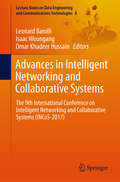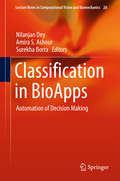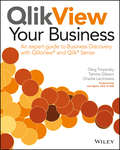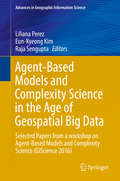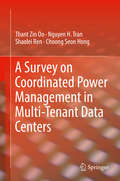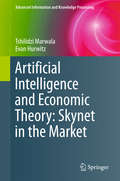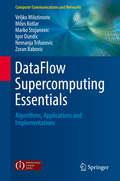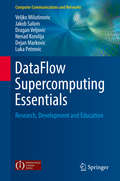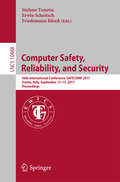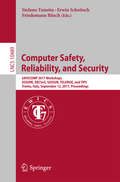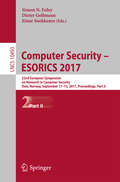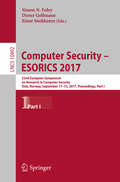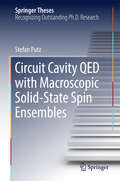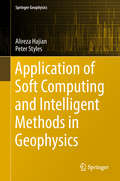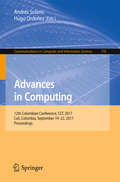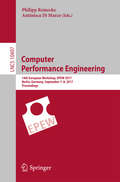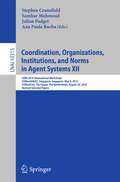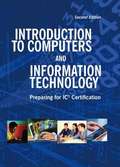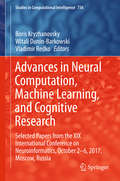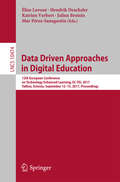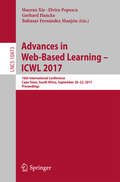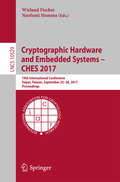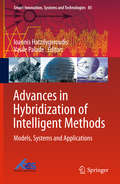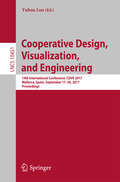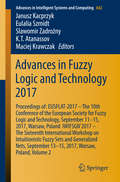- Table View
- List View
Advances in Intelligent Networking and Collaborative Systems: The 9th International Conference on Intelligent Networking and Collaborative Systems (INCoS-2017) (Lecture Notes on Data Engineering and Communications Technologies #8)
by Isaac Woungang Leonard Barolli Omar Khadeer HussainThe aim of this book is to provide the latest research findings, innovative research results, methods and development techniques from both theoretical and practical perspectives related to intelligent social networks and collaborative systems, intelligent networking systems, mobile collaborative systems, secure intelligent cloud systems, etc. , and to reveal synergies among various paradigms in the multi-disciplinary field of intelligent collaborative systems. It presents the Proceedings of the 9th International Conference on Intelligent Networking and Collaborative Systems (INCoS-2017), held on August 24-26, 2017 in Toronto, Canada. With the rapid evolution of the Inte rnet, we are currently experiencing a shift from the traditional sharing of information and applications as the main purpose of the Web to an emergent paradigm that puts people at the very centre of networks and exploits the value of people's connections, relations and collaborations. Social networks are also playing a major role in the dynamics and structure of intelligent Web-based networking and collaborative systems. Virtual campuses, virtual communities and organi zations effectively leverage intelligent networking and collaborative systems by tapping into a broad range of formal and informal electronic relations, such as business-to-business, peer-to-peer and many types of online collaborative learning interactions, including the emerging e-learning systems. This has resulted in entangled systems that need to be managed efficiently and autonomously. In addition, the latest and powerful technologies based on Grid and wireless infrastructure as well as Cloud computing are now greatly enhancing collaborative and networking applications, but are also facing new issues and challenges. The principal objective of the research and development community is to stimulate research that leads to the creation of responsive environments for networking and, in the longer-term, the development of adaptive, secure, mobile, and intuitive intelligent systems for collaborative work and learning.
Classification in BioApps: Automation of Decision Making (Lecture Notes in Computational Vision and Biomechanics #26)
by Nilanjan Dey Amira S. Ashour Surekha BorraThis book on classification in biomedical image applications presents original and valuable research work on advances in this field, which covers the taxonomy of both supervised and unsupervised models, standards, algorithms, applications and challenges. Further, the book highlights recent scientific research on artificial neural networks in biomedical applications, addressing the fundamentals of artificial neural networks, support vector machines and other advanced classifiers, as well as their design and optimization. In addition to exploring recent endeavours in the multidisciplinary domain of sensors, the book introduces readers to basic definitions and features, signal filters and processing, biomedical sensors and automation of biomeasurement systems. The target audience includes researchers and students at engineering and medical schools, researchers and engineers in the biomedical industry, medical doctors and healthcare professionals.
QlikView Your Business: An Expert Guide To Business Discovery With Qlikview And Qlik Sense
by Oleg Troyansky Charlie Leichtweis Tammy Gibson Lars Bjorkcomplex data points. Many visualization tools are complex and require advanced training, but QlikView's toolset was specifically designed for speed and ease of use. This book gets you up and running quickly, using QlikView and Qlik Sense to deliver timely and relevant results.Develop solutions to analyze sales, profitability, and inventoryUnderstand the business scenarios relevant to each solutionUnderstand best practices for data modelingLearn advanced techniques in data aggregation and chart developmentThis book goes beyond the basics to illustrate little-known features and techniques for getting the most out of the toolset, supporting the needs of the business analysts who use it, as well as the developers who support it. QlikView Your Business is your essential guide to better data analysis.
Agent-Based Models and Complexity Science in the Age of Geospatial Big Data: Selected Papers from a workshop on Agent-Based Models and Complexity Science (GIScience 2016) (Advances in Geographic Information Science)
by Liliana Perez Eun-Kyeong Kim Raja SenguptaThis book contains a selection of papers presented during a special workshop on Complexity Science organized as part of the 9th International Conference on GIScience 2016. Expert researchers in the areas of Agent-Based Modeling, Complexity Theory, Network Theory, Big Data, and emerging methods of Analysis and Visualization for new types of data explore novel complexity science approaches to dynamic geographic phenomena and their applications, addressing challenges and enriching research methodologies in geography in a Big Data Era.
A Survey on Coordinated Power Management in Multi-Tenant Data Centers
by Thant Zin Oo Nguyen H. Tran Shaolei Ren Choong Seon HongThis book investigates the coordinated power management of multi-tenant data centers that account for a large portion of the data center industry. The authors include discussion of their quick growth and their electricity consumption, which has huge economic and environmental impacts. This book covers the various coordinated management solutions in the existing literature focusing on efficiency, sustainability, and demand response aspects. First, the authors provide a background on the multi-tenant data center covering the stake holders, components, power infrastructure, and energy usage. Then, each power management mechanism is described in terms of motivation, problem formulation, challenges and solution.
Artificial Intelligence and Economic Theory: Skynet in the Market (Advanced Information and Knowledge Processing)
by Tshilidzi Marwala Evan HurwitzThis book theoretically and practically updates major economic ideas such as demand and supply, rational choice and expectations, bounded rationality, behavioral economics, information asymmetry, pricing, efficient market hypothesis, game theory, mechanism design, portfolio theory, causality and financial engineering in the age of significant advances in man-machine systems. The advent of artificial intelligence has changed many disciplines such as engineering, social science and economics. Artificial intelligence is a computational technique which is inspired by natural intelligence concepts such as the swarming of birds, the working of the brain and the pathfinding of the ants. Artificial Intelligence and Economic Theory: Skynet in the Market analyses the impact of artificial intelligence on economic theories, a subject that has not been studied. It also introduces new economic theories and these are rational counterfactuals and rational opportunity costs. These ideas are applied to diverse areas such as modelling of the stock market, credit scoring, HIV and interstate conflict. Artificial intelligence ideas used in this book include neural networks, particle swarm optimization, simulated annealing, fuzzy logic and genetic algorithms. It, furthermore, explores ideas in causality including Granger as well as the Pearl causality models.
DataFlow Supercomputing Essentials: Algorithms, Applications and Implementations (Computer Communications and Networks)
by Nemanja Trifunovic Veljko Milutinovic Milos Kotlar Marko Stojanovic Igor Dundic Zoran BabovicThis informative text/reference highlights the potential of DataFlow computing in research requiring high speeds, low power requirements, and high precision, while also benefiting from a reduction in the size of the equipment. The cutting-edge research and implementation case studies provided in this book will help the reader to develop their practical understanding of the advantages and unique features of this methodology. This work serves as a companion title to DataFlow Supercomputing Essentials: Algorithms, Applications and Implementations, which reviews the key algorithms in this area, and provides useful examples. Topics and features: reviews the library of tools, applications, and source code available to support DataFlow programming; discusses the enhancements to DataFlow computing yielded by small hardware changes, different compilation techniques, debugging, and optimizing tools; examines when a DataFlow architecture is best applied, and for which types of calculation; describes how converting applications to a DataFlow representation can result in an acceleration in performance, while reducing the power consumption; explains how to implement a DataFlow application on Maxeler hardware architecture, with links to a video tutorial series available online. This enlightening volume will be of great interest to all researchers investigating supercomputing in general, and DataFlow computing in particular. Advanced undergraduate and graduate students involved in courses on Data Mining, Microprocessor Systems, and VLSI Systems, will also find the book to be a helpful reference.
DataFlow Supercomputing Essentials: Research, Development and Education (Computer Communications and Networks)
by Dejan Markovic Jakob Salom Veljko Milutinovic Dragan Veljovic Nenad Korolija Luka PetrovicThis informative text/reference highlights the potential of DataFlow computing in research requiring high speeds, low power requirements, and high precision, while also benefiting from a reduction in the size of the equipment. The cutting-edge research and implementation case studies provided in this book will help the reader to develop their practical understanding of the advantages and unique features of this methodology. This work serves as a companion title to DataFlow Supercomputing Essentials: Algorithms, Applications and Implementations, which reviews the key algorithms in this area, and provides useful examples. Topics and features: reviews the library of tools, applications, and source code available to support DataFlow programming; discusses the enhancements to DataFlow computing yielded by small hardware changes, different compilation techniques, debugging, and optimizing tools; examines when a DataFlow architecture is best applied, and for which types of calculation; describes how converting applications to a DataFlow representation can result in an acceleration in performance, while reducing the power consumption; explains how to implement a DataFlow application on Maxeler hardware architecture, with links to a video tutorial series available online. This enlightening volume will be of great interest to all researchers investigating supercomputing in general, and DataFlow computing in particular. Advanced undergraduate and graduate students involved in courses on Data Mining, Microprocessor Systems, and VLSI Systems, will also find the book to be a helpful reference.
Computer Safety, Reliability, and Security: 36th International Conference, SAFECOMP 2017, Trento, Italy, September 13-15, 2017, Proceedings (Lecture Notes in Computer Science #10488)
by Friedemann Bitsch Erwin Schoitsch Stefano TonettaSAFECOMP '96 contains papers presented at the 15th International Conference on Computer Safety, Reliability and Security held in Vienna, Austria, 23-25 October 1996. The conference aimed to provide an opportunity for technical developers and users to discuss and review their experiences, to consider the best technologies currently available, and to identify the skills and technologies required for the future. SAFECOMP '96 focuses on critical computer applications and is intended as a platform for technology transfer between academia, industry and research institutions. SAFECOMP '96 will be of interest to all those in universities, research institutions, industry and business who want to be well-informed about the current international state of the art in computer safety, reliability and security.
Computer Safety, Reliability, and Security: SAFECOMP 2017 Workshops, ASSURE, DECSoS, SASSUR, TELERISE, and TIPS, Trento, Italy, September 12, 2017, Proceedings (Lecture Notes in Computer Science #10489)
by Friedemann Bitsch Erwin Schoitsch Stefano TonettaSAFECOMP '96 contains papers presented at the 15th International Conference on Computer Safety, Reliability and Security held in Vienna, Austria, 23-25 October 1996. The conference aimed to provide an opportunity for technical developers and users to discuss and review their experiences, to consider the best technologies currently available, and to identify the skills and technologies required for the future. SAFECOMP '96 focuses on critical computer applications and is intended as a platform for technology transfer between academia, industry and research institutions. SAFECOMP '96 will be of interest to all those in universities, research institutions, industry and business who want to be well-informed about the current international state of the art in computer safety, reliability and security.
Computer Security – ESORICS 2017: 22nd European Symposium On Research In Computer Security, Oslo, Norway, September 11-15, 2017, Proceedings, Part I (Lecture Notes in Computer Science #10492)
by Dieter Gollmann Simon N. Foley Einar SnekkenesThe two-volume set, LNCS 10492 and LNCS 10493 constitutes the refereed proceedings of the 22nd European Symposium on Research in Computer Security, ESORICS 2017, held in Oslo, Norway, in September 2017. The 54 revised full papers presented were carefully reviewed and selected from 338 submissions. The papers address issues such as data protection; security protocols; systems; web and network security; privacy; threat modeling and detection; information flow; and security in emerging applications such as cryptocurrencies, the Internet of Things and automotive.
Computer Security – ESORICS 2017: 22nd European Symposium On Research In Computer Security, Oslo, Norway, September 11-15, 2017, Proceedings, Part I (Lecture Notes in Computer Science #10492)
by Dieter Gollmann Simon N. Foley Einar SnekkenesThe two-volume set, LNCS 10492 and LNCS 10493 constitutes the refereed proceedings of the 22nd European Symposium on Research in Computer Security, ESORICS 2017, held in Oslo, Norway, in September 2017. The 54 revised full papers presented were carefully reviewed and selected from 338 submissions. The papers address issues such as data protection; security protocols; systems; web and network security; privacy; threat modeling and detection; information flow; and security in emerging applications such as cryptocurrencies, the Internet of Things and automotive.
Circuit Cavity QED with Macroscopic Solid-State Spin Ensembles (Springer Theses)
by Stefan PutzThis thesis combines quantum electrical engineering with electron spin resonance, with an emphasis on unraveling emerging collective spin phenomena. The presented experiments, with first demonstrations of the cavity protection effect, spectral hole burning and bistability in microwave photonics, cover new ground in the field of hybrid quantum systems. The thesis starts at a basic level, explaining the nature of collective effects in great detail. It develops the concept of Dicke states spin-by-spin, and introduces it to circuit quantum electrodynamics (QED), applying it to a strongly coupled hybrid quantum system studied in a broad regime of several different scenarios. It also provides experimental demonstrations including strong coupling, Rabi oscillations, nonlinear dynamics, the cavity protection effect, spectral hole burning, amplitude bistability and spin echo spectroscopy.
Application of Soft Computing and Intelligent Methods in Geophysics (Springer Geophysics)
by Alireza Hajian Peter StylesThis book provides a practical guide to applying soft-computing methods to interpret geophysical data. It discusses the design of neural networks with Matlab for geophysical data, as well as fuzzy logic and neuro-fuzzy concepts and their applications. In addition, it describes genetic algorithms for the automatic and/or intelligent processing and interpretation of geophysical data.
Advances in Computing: 12th Colombian Conference, CCC 2017, Cali, Colombia, September 19-22, 2017, Proceedings (Communications in Computer and Information Science #735)
by Andrés Solano Hugo OrdoñezThis book constitutes the refereed proceedings of the 12th Colombian Conference on Computing, CCC 2017, held in Cali, Colombia, in September 2017. <P><P> The 56 revised full papers presented were carefully reviewed and selected from 186 submissions. The papers are organized in topical sections on information and knowledge management, software engineering and IT architectures, educational informatics, intelligent systems and robotics, human-computer interaction, distributed systems and large-scale architectures, image processing, computer vision and multimedia, security of the information, formal methods, computational logic and theory of computation.
Computer Performance Engineering: 14th European Workshop, EPEW 2017, Berlin, Germany, September 7-8, 2017, Proceedings (Lecture Notes in Computer Science #10497)
by Antinisca Di Marco Philipp ReineckeThis book constitutes the refereed proceedings of the 14th European Workshop on Computer Performance Engineering, EPEW 2017, held in Berlin, Germany, in September 2017. The 18 papers presented together with the abstracts of two invited talks in this volume were carefully reviewed and selected from 30 submissions. The papers presented at the workshop reflect the diversity of modern performance engineering, with topics ranging from advances in Markov models; advances in quantitative analysis; model checking; and cyber-physical systems to performance, energy and security.
Coordination, Organizations, Institutions, and Norms in Agent Systems XII: COIN 2016 International Workshops, COIN@AAMAS, Singapore, Singapore, May 9, 2016, COIN@ECAI, The Hague, The Netherlands, August 30, 2016, Revised Selected Papers (Lecture Notes in Computer Science #10315)
by Julian Padget Ana Paula Rocha Stephen Cranefield Samhar MahmoudThis book constitutes the thoroughly refereed post-conference proceedings of the 12th International Workshops on Coordination, Organizations, Institutions and Norms in Agent Systems, COIN 2016. The workshop COIN@AAMAS 2016 was held in Singapore, Singapore, in May 2016, and the workshop COIN@ECAI 2016 was held in The Hague, The Netherlands, in August 2016. The 9 full papers were carefully reviewed and selected from 15 submissions for inclusion in this volume. They cover the following topics:Social Issues: The papers focus on the security of personal data, support for self-care for individuals with chronic conditions, analysis of the risk of information leakage in social networks, and an analysis of issues arising in the design of on-line environments whose participants are human and software. Teams: The papers consider different aspects of team working: what kinds of knowledge sharing best contribute to effective team performance and how to organize a tea m to function effectively in different kinds of scenarios. Rights and Values: The papers examine complementary issues that influence the effective design of normative systems, namely how to detect opportunism so that it may be discouraged, how individuals values influence (collective) decision-making processes and how rights and powers relate to value and conflict resolution in nested organizational structures.
Introduction to Computers and Information Technology: Preparing for IC3 Certification (Second Edition)
by Prentice HallIntroduction to Computers and Information Technology teaches essential computer technology concepts and skills. This text helps students build a concrete understanding of how computers work and how various types of computing devices and accessories are used in school, work, and at home. The text covers objectives of IC3 GS5 and IC3 Spark standards.
Advances in Neural Computation, Machine Learning, and Cognitive Research: Selected Papers from the XIX International Conference on Neuroinformatics, October 2-6, 2017, Moscow, Russia (Studies in Computational Intelligence #736)
by Boris Kryzhanovsky Witali Dunin-Barkowski Vladimir RedkoThis book describes new theories and applications of artificial neural networks, with a special focus on neural computation, cognitive science and machine learning. It discusses cutting-edge research at the intersection between different fields, from topics such as cognition and behavior, motivation and emotions, to neurocomputing, deep learning, classification and clustering. Further topics include signal processing methods, robotics and neurobionics, and computer vision alike. The book includes selected papers from the XIX International Conference on Neuroinformatics, held on October 2-6, 2017, in Moscow, Russia.
Data Driven Approaches in Digital Education: 12th European Conference on Technology Enhanced Learning, EC-TEL 2017, Tallinn, Estonia, September 12–15, 2017, Proceedings (Lecture Notes in Computer Science #10474)
by Katrien Verbert Hendrik Drachsler Élise Lavoué Mar Pérez-Sanagustín Julien BroisinThis book constitutes the proceedings of the 12th European Conference on Technology Enhanced Learning, EC-TEL 2017, held in Tallinn, Estonia, in September 2017. The 24 full papers, 23 short papers, 6 demo papers, and 22 poster papers presented in this volume were carefully reviewed and selected from 141 submissions. The theme for the 12th EC-TEL conference on Data Driven Approaches in Digital Education' aims to explore the multidisciplinary approaches that eectively illustrate how data-driven education combined with digital education systems can look like and what are the empirical evidences for the use of datadriven tools in educational practices.
Advances in Web-Based Learning – ICWL 2017: 16th International Conference, Cape Town, South Africa, September 20-22, 2017, Proceedings (Lecture Notes in Computer Science #10473)
by Baltasar Fernández Manjón Elvira Popescu Haoran Xie Gerhard HanckeThis book constitutes the proceedings of the 16th International Conference on Web-Based Learning, ICWL 2017, held in Cape Town, South Africa, in September 2017. The 13 revised full papers presented together with 9 short papers and 3 poster papers were carefully reviewed and selected from 56 submissions. The papers are organized in topical sections on Inquiry-Based Learning and Gamification; Learning Analytics; Social Media and Web 2. 0-based Learning Environments; Assessment and Accessibility in Higher Education; Open Educational Resources and Recommender Systems; and Practice and Experience Sharing.
Cryptographic Hardware and Embedded Systems – CHES 2017: 19th International Conference, Taipei, Taiwan, September 25-28, 2017, Proceedings (Lecture Notes in Computer Science #10529)
by Naofumi Homma Wieland FischerThis book constitutes the proceedings of the 19th International Conference on Cryptographic Hardware and Embedded Systems, CHES 2017, held in Taipei, Taiwan, in September 2017. The 33 full papers presented in this volume were carefully reviewed and selected from 130 submissions. The annual CHES conference highlights new results in the design and analysis of cryptographic hardware and soft- ware implementations. The workshop builds a valuable bridge between the research and cryptographic engineering communities and attracts participants from industry, academia, and government organizations.
Advances in Hybridization of Intelligent Methods: Models, Systems and Applications (Smart Innovation, Systems and Technologies #85)
by Vasile Palade Ioannis HatzilygeroudisThis book presents recent research on the hybridization of intelligent methods, which refers to combining methods to solve complex problems. It discusses hybrid approaches covering different areas of intelligent methods and technologies, such as neural networks, swarm intelligence, machine learning, reinforcement learning, deep learning, agent-based approaches, knowledge-based system and image processing. The book includes extended and revised versions of invited papers presented at the 6th International Workshop on Combinations of Intelligent Methods and Applications (CIMA 2016), held in The Hague, Holland, in August 2016. The book is intended for researchers and practitioners from academia and industry interested in using hybrid methods for solving complex problems.
Cooperative Design, Visualization, and Engineering: 14th International Conference, CDVE 2017, Mallorca, Spain, September 17-20, 2017, Proceedings (Lecture Notes in Computer Science #10451)
by Yuhua LuoThis book constitutes the refereed proceedings of the 4th International Conference on Cooperative Design, Visualization, and Engineering, CDVE 2007, held in Shanghai, China in September 2007. The papers presented were carefully reviewed from numerous submissions. The papers cover all current issues in cooperative design, visualization, and engineering, ranging from theoretical and methodological topics to various systems and frameworks to applications in a variety of fields.
Advances in Fuzzy Logic and Technology 2017: Proceedings of: EUSFLAT- 2017 – The 10th Conference of the European Society for Fuzzy Logic and Technology, September 11-15, 2017, Warsaw, Poland IWIFSGN’2017 – The Sixteenth International Workshop on Intuitionistic Fuzzy Sets and Generalized Nets, September 13-15, 2017, Warsaw, Poland, Volume 2 (Advances in Intelligent Systems and Computing #642)
by Janusz Kacprzyk Maciej Krawczak Eulalia Szmidt Slawomir Zadrożny K. T. AtanassovThis volume constitutes the proceedings of two collocated international conferences: EUSFLAT-2017 - the 10th edition of the flagship Conference of the European Society for Fuzzy Logic and Technology held in Warsaw, Poland, on September 11-15, 2017, and IWIFSGN'2017 - The Sixteenth International Workshop on Intuitionistic Fuzzy Sets and Generalized Nets, held in Warsaw on September 13-15, 2017. The conferences were organized by the Systems Research Institute, Polish Academy of Sciences, Department IV of Engineering Sciences, Polish Academy of Sciences, and the Polish Operational and Systems Research Society in collaboration with the European Society for Fuzzy Logic and Technology (EUSFLAT), the Bulgarian Academy of Sciences and various European universities. The aim of the EUSFLAT-2017 was to bring together theoreticians and practitioners working on fuzzy logic, fuzzy systems, soft computing and related areas and to provide a platform for exchanging ideas and discussing the l atest trends and ideas, while the aim of IWIFSGN'2017 was to discuss new developments in extensions of the concept of a fuzzy set, such as an intuitionistic fuzzy set, as well as other concepts, like that of a generalized net. The papers included, written by leading international experts, as well as the special sessions and panel discussions contribute to the development the field, strengthen collaborations and intensify networking.
